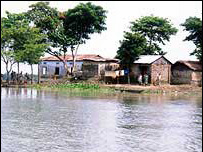
The
summer monsoon affects portions of India
as well as Bangladesh. It can
cause extensive and destructive flooding,
leaving hundreds of thousands homeless
in both countries.
|
|
|
|
The poet Rudyard Kipling wrote in Two Months:
"Fall off, the Thunder bellows her despair to echoing
earth, thrice parched. The lightnings fly In vain. No help
the heaped-up clouds afford, But wearier weight of burdened,
burning air. What truce with Dawn? Look, from the aching sky,
Day stalks, a tyrant with a flaming sword!"
The aching sky – Kipling’s description is an apt one. The still heat
is furnacelike, bringing prickly heat and a lifeless, hazy sky of leached-out
blue. Then suddenly, in May or June, the black-and-white bulbuls appear, pied
crested cuckoos with long tails (Clamator jacobinus) newly arrived from Africa
on the vanguard of the monsoon. Black clouds build again on the horizon, flashes
of lightning in their midst. Thunderclaps sound. Large raindrops spatter the
waiting earth, drying as they hit the ground. Then a giant thundering erupts
as torrential rain cascades onto people’s upturned faces. They run around
wildly in the open, waving their hands, welcoming the cool and the rain.
Monsoon rains are no ordinary storms, over in a few hours. Instead, it rains
and rains. Dark clouds pass over the plains and mountains, bringing shower after
shower through August and September as the monsoon spends its last force against
the distant Himalayas before retreating southward in autumn. The earth turns
from a desert into a sea of muddy puddles. Wells and lakes fill up. Rivers overflow
their banks. Mud-hut walls melt as houses collapse. The land comes alive. Almost
overnight the landscape turns green as grass sprouts, crops grow, and trees acquire
new foliage. Frogs croak day and night, animals breed, farmers plant their crops,
and life begins anew.
Page 1 of 3
|
|
|




